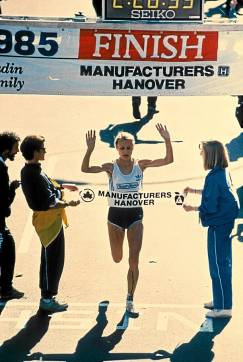There once was a time when the longest distance that women could compete at was 1500m a mere 3¾ laps of a standard track. Into this era there was a Norwegian girl Grete Anderson from the suburbs of Oslo broke into the scene following the sporting footsteps of her brothers Arild and Jan.
In 1971 aged 17 she broke the European junior 1500m record running a time of 4:17. The following summer she made the trip to Munich as part of the Norwegian Olympic team but was knocked out in the heats. However, two years later she did pick up her first senior medal in the 1974 European Athletic championships in Rome.
In 1975 while she was working as PE teacher she met Jack Nilsen and for their married name they settled on his mother's name Waitz and he was to become her coach and make the major shift in her career.
Her first world record came the following year in the double distance 3000 metres (women still not deemed equal the men and able to run 5000m) running 8:46.6 in her native Olso. The following year she went faster still 8:45.4. In the 1978 European championships she again took bronze, this time in the 3000m, however it was seven weeks later that she was to find her true self.
Jack persuaded his wife that even though she had competed in the 3000 meters only weeks before that she was capable of running the New York Marathon, she had never even competed over a Half Marathon before. The race director Fred Lebow also took some persuading to enter this 3000m runner into his race. He eventually allowed her in as a pace maker and gave her the rather anonymous number of 1173F, elite competitors are usually given low numbers. Grete went out and ran at world record pace, and ran at it the whole way, crossing the line first in 2:32:30.
She was to return for nine of the next ten years and only on one of those occasions through injury did she fail to lead the field home. In 1983 she had a perfect year, she won the London Marathon in a World Record 2:25:29* (however Joan Benoit (USA) the following day in Boston ran 2:22:43), winning the inaugural World Marathon Title (the first championship race at this distance) and her fifth New York Marathon title.
She won medals at all the major championships bar one, the Olympics. In the inaugural women's Marathon in Los Angeles 1984 there were four legendary women that everyone wanted to see, Waitz who had been so dominant in the sport over the last 6 years and Benoit who had taken the world record off the Norwegian the previous year, also Portugal's Rosa Mota and fellow Norwegian and season best performer when winning in London Ingrid Kristiansen. It was a top class field hoping to add to their legendary status with that first Olympic gold.
In the smoggy LA conditions Benoit pulled away from the other three to enter the stadium well ahead to finish in a time of 2:24:52 exception under the humidity and smog conditions. Waitz was second to enter the Coliseum to finish in 2:26:18, with Mota watching he from further down the track in 2:26:57, the other Norweigan Kristiansen missed out on the medals with 2:27:34.
In Seoul in 1988 she dropped out at the 18 mile mark with a knee injury. Having flirted with retirement before that first New York Marathon she finally retired in 1991.
She says it was the New York Marathon that made her into a Marathon runner and it New York that proved Fred Lebow wrong she was more than just a hare, she was the thoroughbred that would last the course time and again. She did so again in 1992 when she ran with Lebow who had been diagnosed with a brain tumor in 1990, they ran in together in just over five and a half hours.
In 2005 Waitz herself was diagnosed with cancer, having been renowned for her winter training regime on the treadmill, she carried on with that through her chemotherapy, walking instead of running. In recent years she has been working for the charity Aktiv Mot Kreft (Action Against Cancer). However, she hit the wall with that disease on Tuesday, a second of those strong, courageous, female individuals of my youth to succumb to cancer this week, on the same day.
As a distance runner it was stories like Grete's that actually inspired me. It was the longevity of her career, that always made me think at the end of the Olympics when the sportspeople are called to assemble again in four years time that gave me some outside hope (that was until the last time). She was an inspiration not just to female atheltes like Liz McColgan who said "Grete was the first world-class distance runner and she opened the doors for everyone. If it wasn't for Grete, womens's distance running would not be where it is now." She was also an inspiration to women who are fighting to clear any glass ceiling, as well as an inspiration to all of us to find that niche which is actually us.
Grete Waitz (neé Andersen) 1 October 1953 - 19 April 2011
* Waitz had lowered the woman's mark by nine minutes from Christa Vahlensieck's time of 2:34:47 down to 2:32:30 in 1978, 2:27:33 in 1979, 2:25:41 in 1980, and finally to that 2:25:29 London time. She was to set her personal best 2:24:54 in London in 1986.

No comments:
Post a Comment